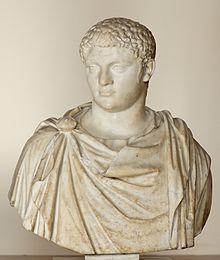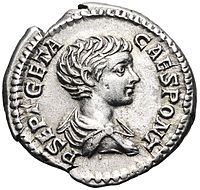Geta (emperor)
This article needs additional citations for verification. (December 2010) |
| Geta | |||||
|---|---|---|---|---|---|
| 23rd Emperor of the Roman Empire | |||||
 | |||||
| Reign | 209 – 4 February 211 (with Severus & Caracalla); February – December 211 (with Caracalla) | ||||
| Predecessor | Septimius Severus (alone) | ||||
| Successor | Caracalla (alone) | ||||
| Born | March 7, 189 Rome | ||||
| Died | December 19, 211 (aged 22) | ||||
| |||||
| Dynasty | Severan | ||||
| Father | Septimius Severus | ||||
| Mother | Julia Domna | ||||
Geta (Latin: Publius Septimius Geta Augustus;[1] 7 March 189 – 19 December 211), was a Roman Emperor co-ruling with his father Septimius Severus and his older brother Caracalla from 209 to his death.
Early life

Geta was the younger son of Septimius Severus by his second wife Julia Domna. Geta was born in Rome, at a time when his father was only a provincial governor at the service of Emperor Commodus.
Geta was always in a place close to his older brother Lucius, the heir known as Caracalla. Perhaps due to this, the relations between the two were difficult from their early years. Conflicts were constant and often required the mediation of their mother. To appease his younger son, Septimius Severus gave Geta the title of Augustus in 209.
During the campaign against the Britons of the early 3rd century, the imperial propaganda presented the image of a happy family that shared the responsibilities of rule. Septimus Severus entrusted his wife Julia Domna as his counsellor, his older son Caracalla as his second in command, and gave administrative and bureaucratic duties to his younger son Geta. In reality, however, the rivalry and antipathy between the brothers was far from resolved.
Joint Emperor
When Septimius Severus died in Eboracum in the beginning of 211, Caracalla and Geta were proclaimed joint emperors and returned to Rome.

Regardless, the shared throne was not a success: the brothers argued about every decision, from law to political appointments. Later sources speculate about the desire of the two of splitting the empire in two halves. By the end of the year, the situation was unbearable. Caracalla tried to murder Geta during the festival of Saturnalia without success. Later in December he arranged a meeting with his brother in his mother's apartments, and had him murdered in her arms by centurions.
| Roman imperial dynasties | ||
|---|---|---|
| Severan dynasty - tondo.png | ||
| Severan dynasty | ||
| Chronology | ||
|
193–211 |
||
|
with Caracalla 198–211 |
||
|
with Geta 209–211 |
||
|
211–217 |
||
|
211 |
||
|
Macrinus' usurpation 217–218 |
||
|
with Diadumenian 218 |
||
|
218–222 |
||
|
222–235 |
||
| Dynasty | ||
| Severan dynasty family tree | ||
|
All biographies |
||
| Succession | ||
|
||
Following Geta's assassination, Caracalla damned his memory and ordered his name to be removed from all inscriptions. The now sole emperor also took the opportunity to get rid of his political enemies, on the grounds of conspiracy with the deceased. Cassius Dio [2] stated that around 20,000 persons of both sexes were killed or proscribed during this time.
See also
Notes
- ^ In Classical Latin, Geta's name would be inscribed as PVBLIVS SEPTIMIVS GETA AVGVSTVS.
- ^ Cassius Dio, Roman History [1]
References
- Dio Cassius lxxvii; Herodian iv. I.
External links
![]() Media related to Publius Septimius Geta at Wikimedia Commons
Media related to Publius Septimius Geta at Wikimedia Commons
- Life of Geta (Historia Augusta at LacusCurtius: Latin text and English translation)
- 189 births
- 211 deaths
- Carthaginians
- 3rd-century Roman emperors
- Imperial Roman consuls
- Severan Dynasty
- Septimii
- People from Rome (city)
- British traditional history
- Murdered Roman emperors
- Deified Roman emperors
- Roman emperors to suffer posthumous denigration or damnatio memoriae
- People from Homs
- Royal Family of Emesa
